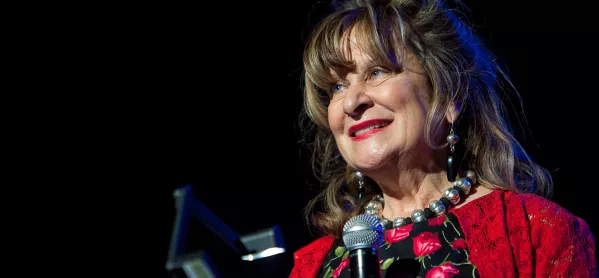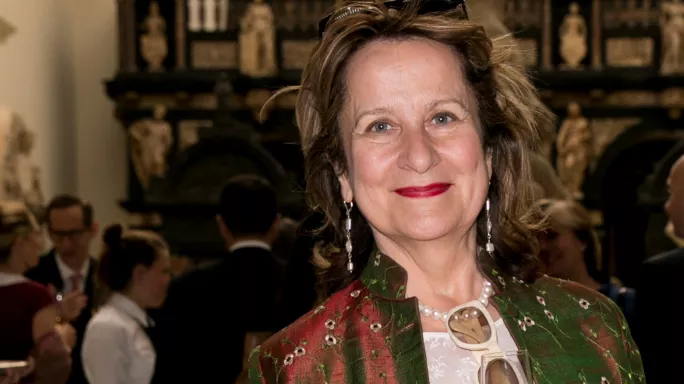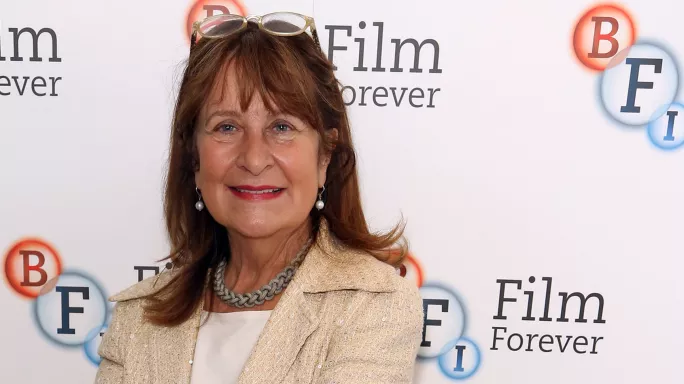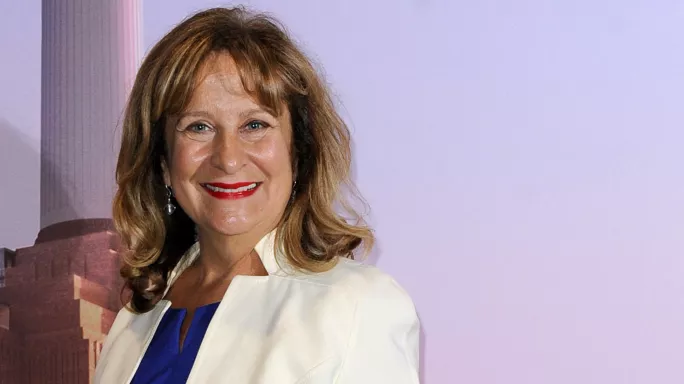Meet Baroness Helena Kennedy: Ahead of her time in FE

Helena Kennedy has a very, very long list of achievements after her name. Her legal career is astonishing, she was made a Labour peer in the late 1990s - she is officially known as Baroness Kennedy of The Shaws - and, of course, she spearheaded the life-changing Helena Kennedy Foundation.
When looking back at her career, it’s hard to pinpoint what her proudest moments could be, simply because they are so many. But, she tells me, one of the “greatest joys” of her life was publishing the further education report, Learning Works, in 1997.
“Being asked to chair the Further Education Funding Council’s committee on widening participation in further education was one of the great joys of my life: these were my people,” she says.
“Two of my sisters left school at 15. And when one of them was married with children, in her thirties, she went back to education and got a second chance. She went to a further education college, she got her Highers, went to Glasgow University, did an English degree, and became a teacher. FE changed her life. I’d seen it happen close-up.”
Many of the recommendations made in her report are echoed in the new Skills and Post-16 Education Bill - and while Kennedy says she will support any bill which seeks to improve lives through skills, the government needs to “put money where their mouths are” to make it happen, she insists.
Yes, it’s clear, 23 years after her report, Kennedy still has lots to say about further education.
Background: The Kennedy Report and the main recommendations
More: ‘Why the Helena Kennedy Foundation still matters’
Long read: Meet Ann Limb, further education icon
Kennedy was born in Glasgow in the 1950s, and was one of four daughters. She says her parents didn’t have an easy time of it; “there were four kids in a two-room and a kitchen” and, by her own description, they had little money. But her childhood was extremely happy, she says - and she speaks with much admiration about both of her parents. It’s easy to see the huge influence they had on her, even later in life.
Her father was in the army for six years during the Second World War, and by the time she was born, he was back home with the family, working as a dispatch hand in the printing press. She describes him as a “working-class trade unionist” who loved to read, and who took her to the library every week.
“He didn’t get the education that really he would have loved, and therefore, he was very encouraging. He read all the time, he did the crossword all the time, he was aspirational for his children,” she remembers.
Her mother was a devout Catholic and supported women in the local community - those who had husbands who were alcoholics, or who were violent towards them. Kennedy remembers sitting in the corner, hiding behind a book, observing.
“I remember my mother helping a girl who lived in our tenement who was being abused by her husband,” she says. “My mother used to salt away money, so if ever there was an emergency, she could get her hands on some cash. I remember her giving the cash to the girl, and saying ‘get yourself a ticket, darling, and go home to your parents’.”
As an avid reader, Kennedy thrived at school - “my aunts who would say, ‘that girl is going to make herself ill, her brain will burst, get out there and play the back’” - and her teachers encouraged her to do subjects like Greek and Latin, and ultimately go on to university. Spurred on by her parents’ work in their communities, and with an overriding sense of wanting to help people, Kennedy decided she’d study law.

A love of the law
Those who did go to university in her community normally stayed at home and went to the University of Glasgow. But Kennedy had been bitten by the London bug after spending summers with her elder sister and her husband in the English capital, and moved to England to study at the Council of Legal Education. It wasn’t smooth sailing at first.
“There were very few women studying law, certainly not from my class background. I was a working-class girl, I was clever. I’d been a school captain, I’d been all those good things. But when I started studying, I was surrounded mainly by upper-middle class men who had gone to great independent boarding schools,” she says.
“They weren’t used to women, I went to a Catholic school, but it was mixed with boys and girls, and so I had lots of friends who were boys. When I was friendly to people, they all thought I was, you know, coming on to them. I had to beat them back, it was so weird.”
While she was at university, Kennedy got further involved in civil and human rights. She’d made friends with students from the Commonwealth who opened her eyes to colonialism and racism, and attended demonstrations against the Vietnam war, as well as protests against rules that said Commonwealth students would have to go home after their studies.
“I learned a lot about politics and international geopolitics. It was also the beginning of [second-wave] feminism,” she says. “I was brought up in a household which had a class perspective, but I suddenly was having my eyes opened to the ways in which women were doubly burdened.”
Kennedy says it was “hell” trying to get a pupillage (the final training to becoming a barrister). “Chambers used to say ‘we don’t take women’. They were quite blatant about it. You were not a worthy investment because you shovel off and get married and have children, and they certainly weren’t going to invest in a working-class girl from Glasgow with an accent,” she says,
In the end, she managed to get a place, completed her training, and decided to pursue criminal law. But the glass ceiling was in the way yet again: most chambers didn’t want to employ women. But determined to follow her dreams, Kennedy, along with two other women and three men, set up their own chambers.
And the rest, as they say, is history. Kennedy built an incredible career as a criminal and human rights barrister. She worked on domestic violence cases, represented young black men who were being arrested at demonstrations and gay men who were arrested for cottaging, as well as leading on a lot of the IRA cases in Northern Ireland.

Changing lives through education
So how does education fit in with all this? In the 1980s, Kennedy was building her profile and found herself being invited on radio shows like Women’s Hour. There, she’d talk about her working-class roots, her father’s love of learning and the importance of state education.
In the 1990s, after years of Thatcherism, publisher and philanthropist Paul Hamlyn donated £1 million to set up a new national education commission to look at education cradle to grave. Kennedy was invited to be on the commission - which then led her to being asked to chair the Further Education Funding Council in 1997.
“When I wasn’t in court doing trials, I would go and visit parts of the country where there was serious deprivation, and see all the inventive ways which FE can reach people and give them opportunities to re-skill. The messaging is all there in the report, I became very passionate about it,” she says.
“I met the most wonderful people in the further education sector, and my God, is it the Cinderella sector. Education changed my life, and it could have changed my clients’ lives. People say to me, ‘how did you learn about human rights?’ and so on. You’ll learn about it through the pain of your clients and their experiences of life. So many of the people who I acted for, their lives had taken wrong turns because they hadn’t had opportunities.
“There were clever, young black men who I acted for who were drug dealers. But they would have worked in the City and become mega rich if they’d had the opportunities. They were really clever boys, but they were on the street. Education is all about how you can harness those skills, those talents, the raw stuff humankind is made of, and make the most of it.”

The legacy of the Helena Kennedy Foundation
It’s clear the commission ignited a passion in Kennedy, so when, in 1998, further education principal Ann Limb approached her to ask if she’d help set up a new foundation that would grant disadvantaged learners the money to go on to higher education, she jumped at the chance.
And so, the Helena Kennedy Foundation was born - “I really didn’t want it to be called that, but Ann insisted,” she laughs - and has gone to be life changing for thousands of students. Just two years ago, when Kennedy was in Pakistan, she was reminded of the foundation’s reach.
“I was in Pakistan talking about human rights, the rule of law and women’s rights, and a beautiful, elegant woman comes up to me and says: ‘Do you remember me?’, and I said, ‘Yes, I know you!’. Her name was Maleeka Bokhari. Her family had asylum in Britain, they had fled from Pakistan, because her father was deemed an enemy of the state. They’d had to flee with nothing, arrived here and lived in a high-rise block of flats,” she says.
“She knew nothing about our education system, and she worked hard, got her A levels, and we gave her a grant to go to Bristol University where she studied law. When she finished her degree, she came to court with me and did a bit of her pupillage with me. I gave her books and so on about women’s rights. And now, she’s in the ministry of law and justice, and is the number two minister in Pakistan.”
Throughout her career, Kennedy has kept her links to education in other ways too: she was chancellor of Oxford Brookes University, as well as later elected principal of Mansfield College, University of Oxford. She’s currently the chancellor of Sheffield Hallam University.
“With Sheffield Hallam, I liked that it was giving opportunities to my folk, it was giving opportunities to so many wonderful young people in the region and beyond. It does wonderful stuff, and again, is life changing. It couldn’t be a more different place from Oxford, but is equally wonderful in a different way,” she says.
“That’s what education should be about. There should be all those different possibilities and different kinds of opportunity and different things will work better for certain people. I learn, too; I do always learn from the different places that I’ve been.”
At the age of 71, Kennedy is not slowing down: she’s still an active QC and represents people from all over the world, as well as being involved in a huge number of organisations, including the Foreign Policy Centre’s Advisory Council and serving as vice president of the Campaign for Homosexual Equality.
Her spare time - what she has of it - is spent with her loved ones: she’s got three children and four grandchildren, and loves being around people.
“I like sitting right at the dinner table and changing the world. I’m a party girl,” she laughs. “The pandemic has been painful in that I haven’t got to see so many of the people who I love. But I have had a lot of time to read; I love reading, and really, I’m still that little girl sat on the floor with a storybook.”
You need a Tes subscription to read this article
Subscribe now to read this article and get other subscriber-only content:
- Unlimited access to all Tes magazine content
- Exclusive subscriber-only stories
- Award-winning email newsletters
Already a subscriber? Log in
You need a subscription to read this article
Subscribe now to read this article and get other subscriber-only content, including:
- Unlimited access to all Tes magazine content
- Exclusive subscriber-only stories
- Award-winning email newsletters